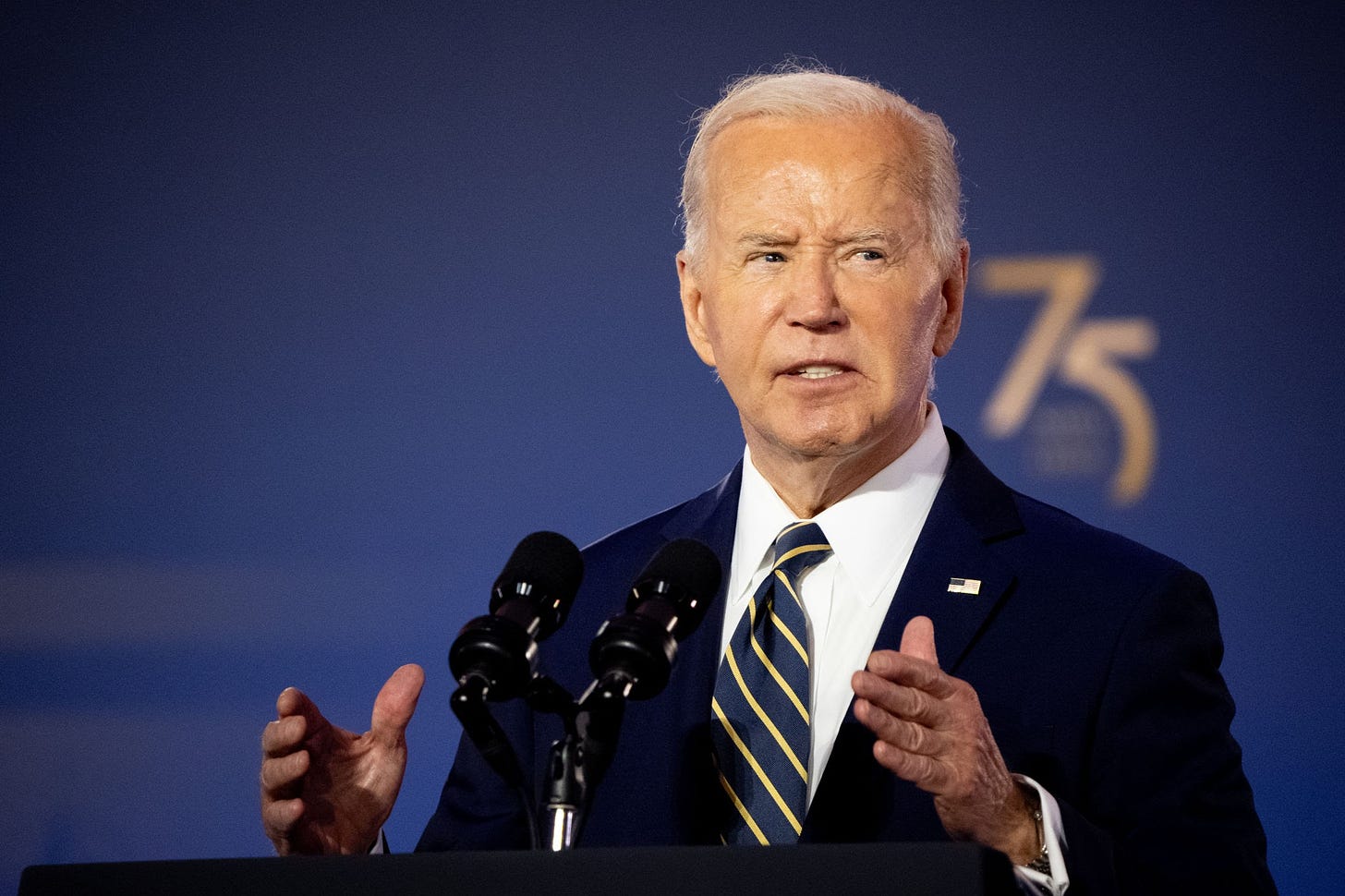Joe Biden speaks tonight at his only Democratic National Convention as a sitting president. Thinking back on his one term in office, I can’t help but be frustrated by the apparent modern incentive system for presidents.
It’s not specifically that I think Biden is getting screwed by history. We don’t really know how he’ll be perceived five, 15, or 50 years from now. And, as they say, politics ain’t beanbag, and there’s no guarantee that people will like you, even if you do the job right.
But it’s worth reflecting on some of his accomplishments. One of them was simply managing a post-pandemic economy. In comparison with a lot of the other major economic powers of the world, the United States has come out of the pandemic astonishingly well. The country’s inflationary period was sharp but relatively brief, the numbers have come down to normal, and unemployment has stayed at historic lows.
Of course, voters don’t really compare their own situations to those of people in Britain, Germany, or Japan. But still, to the extent Biden had a role in this, this looks like a job well done.
Also, it’s kind of wild that Biden ended a war that everyone considered functionally immortal. Both Donald Trump and Barack Obama talked about ending the 20-year conflict in Afghanistan; Biden just stopped it by fiat. And of course, it was a messy ending, but far less messy than what preceded it. And he got no credit for it. Indeed he took a roughly 10-point popularity hit for it, and his approval ratings never recovered. The same aspects of the left who now call him “Genocide Joe” for his role in starting a war in the Middle East that he didn’t start give him absolutely zero credit for ending a war that actually was within his control.
Beyond that, there are a considerable number of legislative achievements that place him among the most productive presidents of the modern age. These include things like the Inflation Reduction Act (which includes massive climate change mitigation investments and support for renewable energy), Covid-era economic support, student loan forgiveness, a gun violence prevention bill, and more.
We know from a lot of research and experience that voters don’t automatically reward policy accomplishments. Indeed, sometimes they punish presidents who accomplish a lot of party priorities. But in all, it’s rather astounding that we have an example of a president who achieved a lot policy-wise, managed the economy through a rocky time resulting in stable growth and low unemployment, and reduced the number of wars the US is fighting, and has been handed his hat.
So what are the incentives for the next president? That a strong economy produces a healthy vote share for the incumbent president’s party has always been a somewhat strange relationship. It makes sense that voters reward something that is so important and gets so much attention as the economy, but in fact, the control presidents have over the economy is rather tentative and indirect, and only works over the long run. Nonetheless, this relationship gives presidents the incentive to do what they can to produce solid economic growth and low unemployment. Would we say that this holds going forward? Is there a way Biden could have influenced the economy that would have left him cruising toward reelection today?
Similarly, Biden gets very little credit for doing the one thing he was specifically nominated to do, which was defeat Trump at the ballot box. He did the job, but he has been pushed aside because a lot of Democrats were (plausibly) concerned he could not do it a second time.
Which gets at the really important question: Why exactly has Biden been so unpopular? As I’ve written before, modern presidential approval ratings just don’t fluctuate all that much. Barack Obama post-2009, Donald Trump, and Joe Biden mostly hung around in the low to mid 40s in terms of popularity. More recently, Biden‘s numbers have dropped a bit below that. My impression is that, given the polarization of the electorate, there’s just not that many people left to make presidents either very popular or very unpopular any more.
Kamala Harris, since emerging from Biden’s shadow over the last month, has become a lot more popular. Should she be elected president, it’s entirely possible that she’ll end up with approval ratings in the low 40s like her immediate predecessors. But at least for now, the difference in approval ratings between her (45%) and Biden (38%) is based on… what exactly? The fact that she’s younger? A more enthusiastic and dynamic campaigner? That she’s far more articulate on critical issues abortion on which Biden is somewhat tongue-tied? Is she just benefitting from the uncertainty of her future views? Or just being a new face?
Again, her policies are not substantially different from his, and she’s obviously tied to his administration’s successes and failures. Her popularity is largely a function of not being Biden, which means… not being old? Not being something that voters don’t want to be reminded of? And what should she or any other future president do to avoid Biden’s fate? It’s not a very comfortable set of conclusions here.






Biden wasn't encouraged to step aside because he was old. He was encouraged to step aside because he seemed to be aging badly, and people wondered not only whether he could wage a successful campaign in the face of the Trump threat but whether he could plausibly govern for the next four years. I'm a longtime Biden fan and think he's given far less credit for his accomplishments while in office than is warranted, but I celebrated when he finally made the decision to step aside. Trump would've won against Biden. With Harris, at least, there's a chance Trump won't be back to haunt and destroy.
I'm on the left, Biden'a departure from Afghanistan is one of his greatest achievements